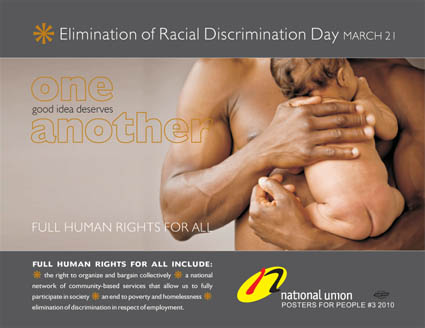This is an archive of news stories and research from the National Union of Public and General Employees. Please see our new site - https://nupge.ca - for the most current information.
Let’s make Aboriginal and racial justice our goal, not just a slogan for one day each year.
Ottawa (21 March 2012) – Today, we mark the International Day for the Elimination of Racial Discrimination. On that day in 1960, South African police opened fire and killed 69 people, mostly women, at a peaceful demonstration against apartheid in Sharpeville South Africa.
Canadian society has marked the day since it was declared by the United Nations in 1966, as a moment of reflection and commitment to racial justice in our own society.
Each year the National Union of Public and General Employees (NUPGE) urges its 340,000 members across the country – and the general public – to raise awareness about the harmful effects of racism in workplaces and communities as well as society as a whole. This poster is available to all. Please click on this image or the link below to download it.
While Canada’s Charter of Rights and Freedoms guarantee equality rights for all Canadians, there still exist disparities for both Aboriginal peoples and people of colour in Canada in growing levels of income inequality, in health status, in public services, in civic participation, in learning outcomes and in the labour market.
We know from various studies for instance, that employment and income disparities persist for Aboriginal and racialized people in Canada, regardless of education. They are more likely to be unemployed and underemployed. Unemployment rates among Aboriginal peoples are 14% and 8.6% for people of colour in Canada compared to 6.2% among other Canadians.
In terms of income inequality, Aboriginal peoples earn 30% less and people of colour in Canada earn an average of 19% less than other Canadians.
The effect of these inequalities means that people of colour in Canada are three times more likely to live in poverty than other Canadians. And how about the fact that one in five of Aboriginal community members are living in poverty and an untold number are living without basic necessities such as adequate housing, clean water and electricity?
The dream of a racism free society is still rather illusive. In fact, those who think Canada is post-racial may wish to review the recently released report from the United Nations Committee on the Elimination of Racial Discrimination looking at Canada’s compliance with the international law on racial equality.
While acknowledging a number of positive steps taken by Canada, the Committee expressed concern over such issues as the growing income inequality among various ethno-racial groups, racial profiling particularly of African Canadians by police, over-representation of Aboriginal peoples and African Canadians in the prison population as well as discrimination they face generally in the criminal justice system. The UN Report also highlights the particular violence and other disadvantage as experienced by Aboriginal women in Canada. It also urges caution around changes to Canada’s refugee system that will discriminate against refugees from the so-called “safe countries”.
Today, there are many opportunities for the federal and provincial governments to step up and address these inequities. They can use their upcoming budgets to introduce measures that will address the perpetual and systemic under-employment and unemployment problems facing Aboriginal and racialized communities, while investing in targeted measures and programs that will benefit members of these communities. For instance, the federal government could take a leadership role by adopting a national poverty reduction strategy with universally applicable but targeted programs that meet the needs of Aboriginal and racialized communities.
Similarly provincial governments can ensure that they balance the current financial challenges they face with maintaining and strengthening investments in poverty reduction among the hardest hit populations, including Aboriginal Peoples and people of colour.
Collectively we should and can lift the social and economic well- being and ensure full equality for all citizens of Canada.
Let’s make Aboriginal and racial justice our goal, not just a slogan for one day each year.
NUPGE
The National Union of Public and General Employees (NUPGE) is one of Canada's largest labour organizations with over 340,000 members. Our mission is to improve the lives of working families and to build a stronger Canada by ensuring our common wealth is used for the common good. NUPGE
More information:
Download NUPGE poster: Elimination of Racial Discrimination Day - March 21

